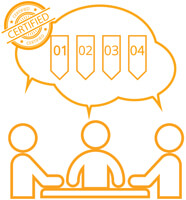Mission Critical Processes
TMail has been designed from scratch to run Mission-critical and Business-critical processes. The following are the characteristics of TMail which make it ideal for Mission-critical processes.
Certified Mail

TMail21 provides a set of guarantees that enable certified (and registered) mail capability. Send Certified Mail such as HR notices, Important Business Documents, Contracts, Statements, Application Forms, Signed Documents, Legal Notices etc. Not only is the act of sending certified, but the content itself is certified. Learn more about TMail’s Certified Mail capabilities.
Certified Processes and Business Transactions

TMail21 provides a set of guarantees that enables certified processes to be run. Use TMail21 to collaborate on Invoices, Orders, Document Signing, Application Forms, B2B and B2C transactions etc. All changes to the process state are certified. All changes are append-only (i.e. non-destructive) and a full non-repudiable audit trail of the entire process is retained. All changes to process state are transactional, i.e. they either all happen or don’t happen at all.
Ideal for B2B, B2C and Lightweight Commerce

TMail21’s Certified Mail and Business Transaction capability makes it ideal for B2B and B2C collaboration, processes, forms and commerce. Additional capabilities like the ability to use your own domain name as part of your TMail address (eg. joe$acme.com instead of joe$acme.tmail21.com) further make it a great fit for this purpose.
Additionally, TMail distinguishes between Person users and Role users. Role users are perfect for institutionalizing B2B, B2C (and even intra-B) processes. For example, a company department (say Acme Accounting Department) could create a Role user accounting$acme.com to which all vendor Invoices, Employee Purchase Orders Requisitions, Invoice Claims, Payment Remittances, Timesheets etc. should be sent.
Agreements

TMail21 supports non-repudiable agreements and contracts. PDF documents can be either manually or digitally signed (the signing is done outside of TMail in a tool like Adobe Reader. See for example https://helpx.adobe.com/reader/using/sign-pdfs.html). Once the signed document is ‘sent’, the resulting transaction will have a globally unique, permanent identifier with the form TMail-Tracking-Number/Changeset#. (eg. 124-134-1245/#5). Because of the append-only nature of TMail Smart Section updates, even if the agreement is later ‘modified’ or ‘deleted’, the original agreement will always be unmodified, valid and non-repudiable. Furthermore, because a TMail has no ‘owner’ (all users are equivalent), no user can remove any other user from the TMail. Thus no contracting party can lose access to the agreement.
Agreements can be renegotiated at any time, but these will result in new versions. In the example above, after several rounds of negotiations the revised contract may be again fully signed at 124-134-1245/#12. From TMail’s perspective, these are two distinct agreements. The precise relationship between the two (#12 supercedes #5 or #12 adds to #5 etc.) will be determined by the wording of the two contract versions.
Security

TMail21 has been designed with security in mind. All connections are encrypted with 128 bit encryption. This is distinct from email where some connections may not be encrypted. (even if your email connection is encrypted, the recipient’s may not be). Further, a user’s identity cannot be spoofed (unlike in email). Passwords are salted before hashing for maximum protection.
Additional security measures will be made available in the upcoming Enterprise Edition.



